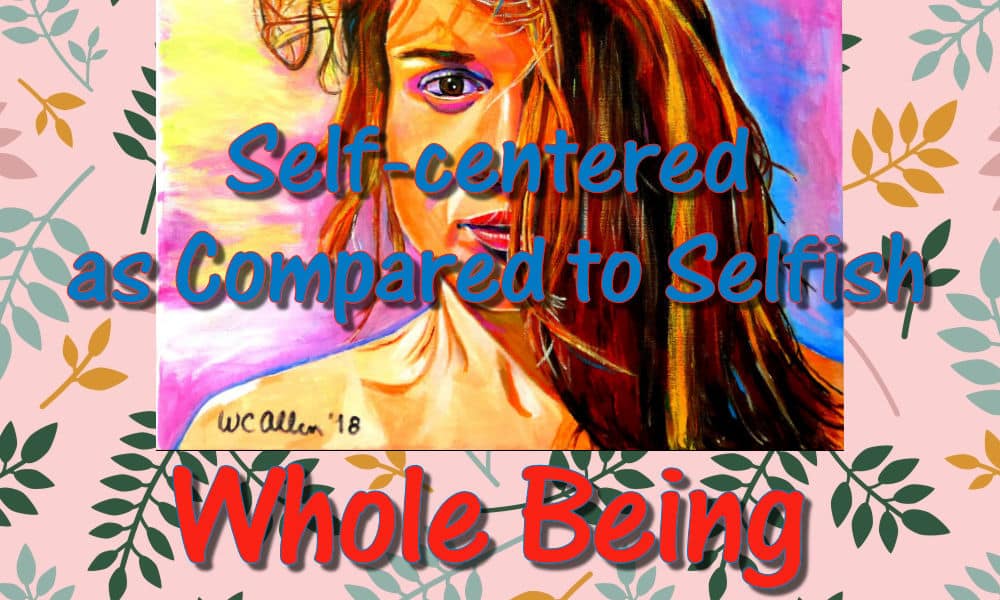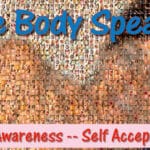- Focussed as compared to scattered — Whole Being
- Awake as Compared to Asleep — Whole Being
- Responsive as Compared to Reactive — Whole Being
- Self-centered as Compared to Selfish — Whole Being
- Honest as Compared to Indirect — Whole Being
- Passionate as compared to Charged — Whole Being
- Awareness as compared to Non-awareness — Whole Living
- Flexible as compared to blocked — Whole Being
Self-centered as compared to selfish — we need to learn to find our focus, and to bring it gently back to learning all there is to know about ourselves

Psst!! Hey!!!
** Want more great writing designed to help YOU to shift your behaviour?
** Want to learn how to find, build or deepen your principal relationship?
** Want to know more about Zen living and being?
Check out Wayne’s books! (amazon link)
Or, check them out right on our site.

In keeping with this series of articles, let me do a quick comparison of terms.
What I’m talking about here is one’s “locus of attention” — the place where the person “lives.”
Before I move to the two above, let me also say that by self-centered I’m differentiating from “other-centered.”
There’s a reason for thinking about this — and the selfish part comes into play in our programming as children.
Let’s define the three terms:
Self-centered: “I like ice cream. I have a quart of Chunky Monkey™, and I’m going to have some now, as I love it. Would you like some too?”
Other-centered: “I like ice cream, but I know you like it more. There’s not much Cherry Garcia™ left, so you take all of it.”
Selfish: “I like ice cream, and not only am I going to eat my Vanilla HEATH® Bar Crunch Ice Cream, I want yours, too.”
About Selfishness
We condition children to fit into society, and most parents pretty ruthlessly try to eradicate selfishness.
My parents’ generation simply stopped their kids from doing what they pleased by using threats. That created a couple of generations worth of people who see as their life’s mission to make up for lost time.
We have multitudes of “boomers” running around grabbing a hold of anything that isn’t nailed down, and using crow bars on the things that are.
Often, such people are the ultimate capitalists.
“I want, I deserve it all” is their motto. This was crystallized in the 80’s in the mantra, “You can have anything you want.”
And of course, there’s a paradox here. There is enough. For everyone. The problem with selfishness is, the selfish person doesn’t know when they have enough. Not being satisfied with one dish of Triple Caramel Chunk™, they want a truck full.
(And yes, I LOVE Ben & Jerry’s Ice Cream!!!)
The cosmos is not kind to those who are greedy and selfish. As is the nature of life, things shift. Things slow down. The creed of the 90’s became, “You can have anything you want. You just can’t have everything you want.”
That was a major counselling issue in the mid-90’s — people wanted to excel in their career, have perfect children and an excellent marriage, and still have time to be a scratch golfer.
They had great trouble grasping the difficulty involved in making even one of these things happen, but because they’d been brought up in a culture obsessed with having and doing everything, they felt incredibly hard done by.
Now, in the 21st century, the rule seems to be, “Unless you are in the 1%, you can’t have everything you want, and maybe you can’t have anything you want.”
Payback time, I guess you’d call it.
And then, there’s the Millennials.
Not that it’s a good idea, but most people can use entitlement language without blushing, so long as it’s generalized. Most people agree that “people should be successful,” or “everyone is entitled to a bigger house or a larger salary,” or whatever.
It gets more interesting when it’s personal. One of the consequences of “my” generation’s upbringing is that we raised our “kids” to think they were special, Indigo kids, Einsteins in the making. They were given whatever they asked for, and even given what they didn’t.
Many of them became personally entitled. They expect praise because they are breathing. They want rewards for doing the minimum. And it is certainly “all about them.”
People who do not overcome entitlement want more of the pie than what they earn. But perhaps more importantly, they want others to provide the extra pie. Not only are they focused on their own needs and wants, they expect the people around them to actively participate in meeting their wants and needs.
They consider themselves the sun, and everyone else is merely a planet circling around.
I remember, some decades ago, working with a nurse who, in the first session, told it that it was my job to see that she didn’t commit suicide. Her friends had been doing that for years, and she’d decided she needed a professional to keep her alive.
When I stopped laughing, I told her that we’d be working on her looking after her own life — if she didn’t want to do that, she could find another therapist.
She was horrified. This was the first time in her entire life that someone wasn’t willing to be manipulated or guilted into put her needs ahead of their own.
After infrequent therapy she quit — saying that she couldn’t continue to work with a therapist who wanted her to stand on her own two feet, without involving others.
About Other-centeredness
The other (dysfunctional) way this can go is that people can be trained not to be selfish by being forced to put the needs of others first. Their life is one trial after another, as they chase their tails trying to be and do what another person wants.
A friend dropped off her 17-year-old at our place, having spent the entire drive berating her for not having her life figured out. Daughter was beside herself. While Darbella hugged her, I said,
“Here’s a secret your mom doesn’t want you to know. You’re going to a party, and she doesn’t want the relatives to hear you don’t have plans for next year, and think she’s a “bad” mom. So she wants you to figure your life out, and tell the relatives, so that others will think your mom is a “good” mom.
All of this is about her, not you.”
We’re not here to be running around doing what other people want us to do. For all you folk that think you’re being a bad kid for not being obedient, it’s time to grow up and be a self-centered adult.
About self-centeredness
My favourite option is finding internal strength and meeting internal needs. In other words, being self-centered. Because, as I often ask,
“Where else would I want my centre to be???”
Being self-centered is all about growing up and standing on our own two feet.
- We choose to be with others, to share, to interact, but not out of neediness or the need to be in control.
- We choose to be alone because we know that, in the end, we nourish ourselves.
- We choose to focus our attention on our vocations, because we are called to be of service.
- Our expectation is not to have everything we want, but to be everything that we are.
- Nothing, not parents, spouses, kids, takes precedence over our need to know ourselves through inter-relatedness and introspection.
This is not selfishness nor self-absorption.
This is living the quest for self-knowledge and self-responsibility. I may choose to be of service, but it will be by choice, not from guilt.
My life will be lived knowing who I am. My actions will be from desire, not imagined obligation.
This week, think about your motivations, and the location of your centre. If you’ve stuck your centre out there somewhere, draw it back in. If you think others should care about your needs, get over yourself. Clean up your walk.





